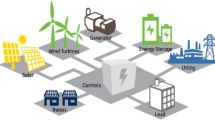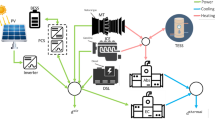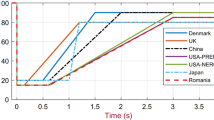Abstract
Providing of energy is one of the most important issues for each country. Also, environmental issues due to fossil fuel depletion are other serious concern of them. In this regard, moving toward energy sustainability is a constructive solution for each country. This paper studies the short-term planning of generating units in renewable energy-based distribution networks equipped with plug-in electric vehicles (PEVs). PEVs can cause problems for distributed energy sources in the electrical grid, as well as power units inside the grid. So, to overcome this problem, an efficient stochastic programming technique is designed to allow the control entity to control the charging behavior of PEVs for managing power units. In this paper, to obtain the least total cost, a new method is suggested to decrease the reliability expenses. In other words, the vehicle-2-grid (V2G) is applied to decrease the operating. On the other hand, a novel stochastic flow using the unscented transform is suggested to improve the model of the severe uncertainty due to the wind power, photovoltaic (PV) and charging/discharging power of PEVs. In this research work, a novel and efficient optimization algorithm called ‘θ-modified krill herd (θ-MKH)” is used as an applicable technique to optimize the microgrid (MG) operation. This algorithm is useful and has many advantages like the runaway from the local optima with fast converging in comparison with other methods. Also, the satisfactory efficiency of the suggested randomized manner is validated on an MG connected to the main grid.












Similar content being viewed by others
Abbreviations
- PEVs:
-
Plug-in electric vehicles
- V2G:
-
Vehicle-2-grid
- PV:
-
Photovoltaic
- θ-MKH:
-
θ-modified krill herd
- MG:
-
Microgrid
- RES:
-
Renewable energy sources
- DG:
-
Distributed generation
- DERs:
-
Distributed energy resources
- FCs:
-
Fuel cells
- MT:
-
Microturbines
- LV:
-
Low-voltage
- EVs:
-
Electric vehicles
- VPPs:
-
Virtual power plants
- MILP:
-
Mixed-integer linear programming
- DRPs:
-
Demand response programs
- UML:
-
Unified modeling language
- MPC:
-
Model predictive control
- MGCC:
-
MG central control
- ST:
-
Start-up
- SD:
-
Shut-down
- ENS:
-
Energy not supplied
- C DG,k :
-
The price of energy, supplied by DG units at each hour
- C Grid :
-
The price, relating to transacting energy with the utility grid at each hour
- C ENS :
-
The cost that should be tolerated as a result of load curtailment at node i ($/kW)
- N DG :
-
The total number of DGs, existing in the network
- N Cus :
-
Total number of customers with satisfied load demand
- La(i) :
-
The average load demand at node i
- Cost DG :
-
The cost of energy generation by DG units.
- \(P_{(DG,k)}^{t}\) :
-
Power generation of DG unit k at time interval t
- \(P_{v}^{t}\) :
-
The power charged/discharged by the PEV fleet v at each time interval t
- DoD i & DoD f :
-
The initial value of DOD and final value of DOD during a discharge cycle respectively
- \(V_{r,i}^{K}\) :
-
The velocity of the ith
- \(V_{ind\;i}^{k}\) :
-
Induction motion
- θi :
-
Phase vector
- M nk :
-
Mean value of the krill population
- Np :
-
The size of population
References
Razmjoo A, Kaigutha LG, Rad MV, Marzband M, Davarpanah A, Denai M (2020) A Technical analysis investigating energy sustainability utilizing reliable renewable energy sources to reduce CO2 emissions in a high potential area. Renew Energ 164:46–57
Ahmed EM, Aly M, Elmelegi A, Alharbi AG, Ali ZM (2019) Multifunctional distributed MPPT controller for 3P4W grid-connected PV systems in distribution network with unbalanced loads. Energies 12(24):4799
Gandoman FH, Ahmadi A, Van den Bossche P, Van Mierlo J, Omar N, Nezhad AE, Mavalizadeh H, Mayet C (2019) Status and future perspectives of reliability assessment for electric vehicles. Reliab Eng Syst Saf 183:1–16
Tabatabaee S, Mortazavi SS, Niknam T (2017) Stochastic scheduling of local distribution systems considering high penetration of plug-in electric vehicles and renewable energy sources. Energy 15(121):480–490
Chen W, Shao Z, Wakil K, Aljojo N, Samad S, Rezvani A (2020) An efficient day-ahead cost-based generation scheduling of a multi-supply microgrid using a modified krill herd algorithm. J Clean Prod 1(272):122364
Yin N, Abbassi R, Jerbi H, Rezvani A, Müller M (2020) A day-ahead joint energy management and battery sizing framework based on θ-modified krill herd algorithm for a renewable energy-integrated microgrid. J Clean Prod 1:124435
Mahmoud K, Abdel-Nasser M, Mustafa E, Ali ZM (2020) Improved salp-swarm optimizer and accurate forecasting model for dynamic economic dispatch in sustainable power systems. Sustainability 12(2):576
Liu C, Abdulkareem SS, Rezvani A, Samad S, Aljojo N, Foong LK, Nishihara K (2020) Stochastic scheduling of a renewable-based microgrid in the presence of electric vehicles using modified harmony search algorithm with control policies. Sustain Cities Soc 3:102183
Mostafa MH, Aleem SH, Ali SG, Abdelaziz AY, Ribeiro PF, Ali ZM (2020) Robust energy management and economic analysis of microgrids considering different battery characteristics. IEEE Access 18(8):54751–54775
Li Y, Mohammed SQ, Nariman GS, Aljojo N, Rezvani A, Dadfar S (2020) Energy management of microgrid considering renewable energy sources and electric vehicles using the backtracking search optimization algorithm. J Energ Resour Technol. https://doi.org/10.1115/1.4046098
Shayegan-Rad A, Badri A, Zangeneh A (2017) Day-ahead scheduling of virtual power plant in joint energy and regulation reserve markets under uncertainties. Energy 121:114–125
Mkahl R, Nait-Sidi-Moh A, Gaber J, Wack M (2017) An optimal solution for charging management of electric vehicles fleets. Electr Power Syst Res 146:177–188
Jannati J, Nazarpour D (2017) Optimal energy management of the smart parking lot under demand response program in the presence of the electrolyser and fuel cell as hydrogen storage system. Energy Convers Manage 138:659–669
Timpner J, Wolf L (2013) Design and evaluation of charging station scheduling strategies for electric vehicles. IEEE Trans Intell Transp Syst 15(2):579–588
Clemente M, Fanti MP, Iacobellis G, Ukovich W (2013) A discrete-event simulation approach for the management of a car sharing service. In2013 IEEE International Conference on Systems, Man, and Cybernetics 2013(pp. 403–408). IEEE
Yang H, Pan H, Luo F, Qiu J, Deng Y, Lai M, Dong ZY (2016) Operational planning of electric vehicles for balancing wind power and load fluctuations in a microgrid. IEEE Trans Sustain Energy 8(2):592–604
Kong F, Xiang Q, Kong L, Liu X (2016) On-line event-driven scheduling for electric vehicle charging via park-and-charge. In2016 IEEE Real-Time Systems Symposium (RTSS) (pp. 69–78). IEEE
Di Giorgio A, Liberati F, Canale S (2013) IEC 61851 compliant electric vehicle charging control in Smartgrids. In21st Mediterranean Conference on Control and Automation (pp. 1329–1335). IEEE
Di Giorgio A, Liberati F (2014) Near real time load shifting control for residential electricity prosumers under designed and market indexed pricing models. Appl Energy 128:119–132
Weckx S, D’Hulst R, Claessens B, Driesensam J (2014) Multiagent charging of electric vehicles respecting distribution transformer loading and voltage limits. IEEE Trans on Smart Grid 5(6):2857–2867
Azar AG, Jacobsen RH (2016) Agent-based charging scheduling of electric vehicles. In2016 IEEE Online Conference on Green Communications (OnlineGreenComm) (pp. 64–69). IEEE
Fanti MP, Mangini AM, Pedroncelli G, Ukovich W (2014) A framework for the distributed management of charging operations. In2014 IEEE International Electric Vehicle Conference (IEVC) 2014 Dec 17 (pp. 1–7). IEEE
Zhou Y, Kumar R, Tang S (2018) Incentive-based distributed scheduling of electric vehicle charging under uncertainty. IEEE Trans Power Syst 34(1):3–11
Ghaedi A, Dehnavi SD, Fotoohabadi H (2016) Probabilistic scheduling of smart electric grids considering plug-in hybrid electric vehicles. J Intell Fuzzy Syst 31(3):1329–1340
Mortazavi SMB, Shiri N, Javadi MS, Dehnavi SD (2015) Optimal planning and management of hybrid vehicles in smart grid. Ciência e Natura 37:253–263
Aghaei J, Nezhad AE, Rabiee A, Rahimi E (2016) Contribution of plug-in hybrid electric vehicles in power system uncertainty management. Renew Sustain Energy Rev 59:450–458
Gandomi AH, Alavi AH (2012) Krill herd: a new bio-inspired optimization algorithm. Commun Nonlinear Sci Numer Simulat 17:4831–4845
Quynh NV, Ali ZM, Alhaider MM, Rezvani A, Suzuki K (2020) Optimal energy management strategy for a renewable-based microgrid considering sizing of battery energy storage with control policies. Int J Energy Res. https://doi.org/10.1002/er.6198
Luo L, Abdulkareem SS, Rezvani A, Miveh MR, Samad S, Aljojo N, Pazhoohesh M (2020) Optimal scheduling of a renewable based microgrid considering photovoltaic system and battery energy storage under uncertainty. J Energy Storage 1(28):101306
Kavousi-Fard A, Rostami MA, Niknam T (2015) Reliability-oriented reconfiguration of vehicle-to-grid networks. IEEE Trans Industr Inf 11(3):682–691
Aien M, Fotouhi-Firuzabad M, Aminfar F (2012) Probabilistic load flow in correlated uncertain environment using unscented transformation. IEEE Trans Power Sys 27(4):2233–2241
Marzband M, Yousefnejad E, Sumper A, Domínguez-García JL (2016) Real time experimental implementation of optimum energy management system in standalone microgrid by using multi-layer ant colony optimization. Int J Electr Power Energy Syst 75:265–274
Kavousi-Fard A, Abunasri A, Zare A, Hoseinzadeh R (2014) Impact of plug-in hybrid electric vehicles charging demand on the optimal energy management of renewable micro-grids. Energy 15(78):904–915
Brown CT, Liebovitch LS, Glendon R (2007) Lévy flights in Dobe Ju/’hoansi foraging patterns. Human Ecol 35(1):129–138
Acknowledgement
This project was funded by King Abdulaziz University, Jeddah, Saudi Arabia and King Abdullah City for Atomic and Renewable Energy, Riyadh, Saudi Arabia under grant no. (KCR-KFL-09-20). Therefore, the authors gratefully acknowledge their technical and financial support.
Author information
Authors and Affiliations
Corresponding author
Ethics declarations
Conflict of interest
The authors declare that there is no conflict of interest.
Additional information
Publisher's Note
Springer Nature remains neutral with regard to jurisdictional claims in published maps and institutional affiliations.
Appendix
Appendix
Data of the two fleets of PEVs.
Fleet # | Capacity (kWh) | |
|---|---|---|
Min | Max | |
1 | 263 | 1973 |
2 | 219 | 1644 |
Fleet # | Charging/discharging rate (kW) | |
|---|---|---|
Min | Max | |
1 | 7.3 | 496 |
2 | 7.3 | 292 |
Rights and permissions
About this article
Cite this article
Aldosary, A., Rawa, M., Ali, Z.M. et al. Energy management strategy based on short-term resource scheduling of a renewable energy-based microgrid in the presence of electric vehicles using θ-modified krill herd algorithm. Neural Comput & Applic 33, 10005–10020 (2021). https://doi.org/10.1007/s00521-021-05768-3
Received:
Accepted:
Published:
Issue Date:
DOI: https://doi.org/10.1007/s00521-021-05768-3




